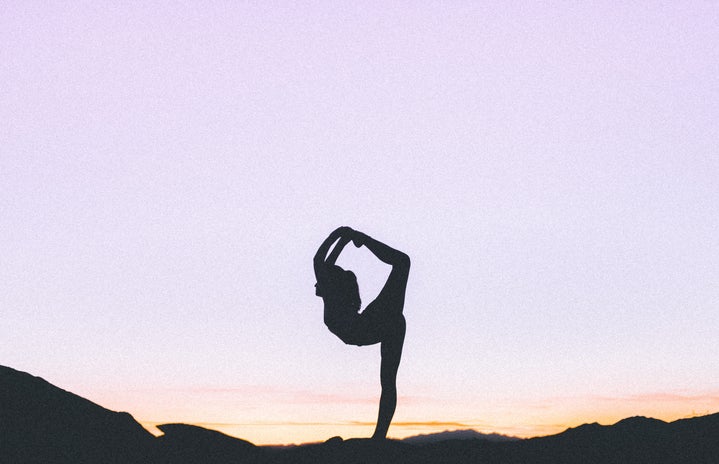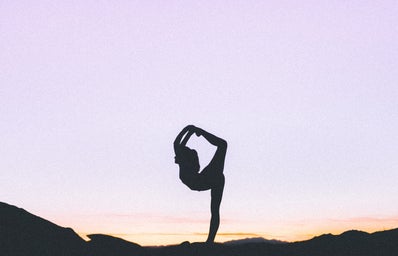Anxiety can present differently from person to person, and each person might have a different way that works for them when overcoming anxiety and anxious feelings or thoughts. Anxiety can be generalized or triggered by certain events, thoughts, etc., and anxious feelings can appear out of nowhere, sometimes even impairing daily functioning. While there is no step-by-step “cure” for anxiety, there are remedies that can help calm your mind and body.
Below are some ways to handle and calm anxiety from 10 women at Cal Poly. (Some women have chosen to remain anonymous).
1. Deep Breathing
“Deep breathing is my go-to, but if I need a distraction, watching a show or movie, getting outside, or calling someone works too,” says Bryn Thomas, a second-year English major. “Sometimes I need a distraction, and sometimes I need to self-regulate. I can usually tell what I need, but if I can’t, I start with deep breathing to ground myself.”
2. Running
“I actually hate running— it’s so hard, but it definitely takes my mind off of things, and I always feel so accomplished afterward. I [also] like to sit in the sun and listen to music,” says Zoe Goldstein, a first-year English major. “I think just tuning everything out— including my negative thoughts— is a helpful way of focusing on myself and finding peace. After that, I like to take some time to figure out where my negative thoughts come from, and why I feel that way.”
3. Self-Care
“[I focus] on spending more time outdoors, reading for fun, listening to music, prioritizing self-care (exercise, skin care, eating well, etc.),” says Emily Middleton, a first-year English major. “It can be really hard to manage struggles with anxiety on top of the struggles of being a college student, but putting in the effort to do things that I know help with my anxiety really makes a difference. In past quarters especially, I made a lot of excuses or let myself be “too busy” to prioritize taking care of my mental health. Even when I am busy though, it is important to make time for myself.”
4. Mediation & Less Phone Time
“I like to meditate in the morning and stay off my phone first thing in the morning and last thing at night. I also love to go on walks and listen to self-growth podcasts! These help me manage my anxiety and calm down before starting each day,” says Yuwa Tennen, a first-year Graphic Communications major. “Digital media is a big cause of anxiety, so starting and ending your day without it makes a huge difference. Walking in nature is also proven to clear your mind and increase mindfulness! These all make a huge difference in my day-to-day life.”
5. Journaling & Therapy
“I feel like journaling and therapy have been the only two things to truly help. Talking it over with people who care about you can feel nice to get off your chest but not necessarily help resolve,” says an anonymous source. “Journaling helps me understand where the anxiety is coming from/what it’s rooted in. Therapy helped me be able to recognize my thoughts, especially when they come, and try to recognize them as thoughts instead of allowing it to spiral. Obviously, these aren’t 100% success rates, but it’s nice to have tools.”
6. Alone Time
“Therapy, music, alone time, and dance [are ways that I deal with anxiety],” says an anonymous source. “Therapy has given me lots of tips and tricks for working through my anxiety. It can be helpful just to talk with someone and explain how you’re feeling. For me being alone is nice because it allows me to fully relax and be in the moment, not worrying about anyone else.”
7. Paint by Numbers & Going to the Gym
“Painting by numbers really helps me because it makes me concentrate on something else rather than the thing that is stressing me out. I like going to the gym because it helps me burn off nervous energy and keeps me away from sitting in my room all day,” says an anonymous source.
8. Laying Down in Nature
“[I like to] lay down in the grass and just stare up at the sky, remembering a memory of one of my happy places,” says an anonymous source. “Sometimes it helps to remind myself I’m just one small part of this large world and there are so many things I’ve already overcome, that I’ll survive this too.”
9. Taking Time Before Bed to Unwind
“No matter what I have planned I always leave myself one hour to read, crochet, watch a show, etc. [before going to bed]. It’s a time for me to “turn my mind off” and regroup for the next day. Whenever I’m feeling stressed I also either eat a snack, get a drink, take a shower, or take a nap. I read an awesome article about how stress can be reduced by taking care of a human’s basic needs first,” says Giulia Spano, a second-year Political Science major. “It helps me to ensure I’m giving myself necessary downtime and that I set some time apart specifically to relax. Just like I schedule my study time, I also schedule my relaxation time. Taking care of those four basic needs can also reduce my stress because scientifically, high cortisol (stress) levels can be caused by a basic need your body is wanting! It also helps to overcome anxious feelings because it is giving your mind a break from what is stressing you out.”
10. Yoga and Mindfulness
Personally, just in the past year, I have found that practicing yoga and mindfulness are extremely helpful in calming my own anxiety. Yoga not only provides calming effects through light exercise but also practicing mindfulness and breathwork, as well as getting in touch with how your body is feeling. I enjoy going to yoga classes because it is an hour of my day where the only thing I have to focus on is my body and my feelings, with no external stressors or pressures. The great thing about practicing mindfulness is you can do it anywhere – the key is to feel grounded in yourself, focus on breathing, and engage in gratitude. Other ways that I have found to help ease anxious feelings include therapy, getting enough sleep, spending time with pets, and consuming less caffeine.
Feelings of anxiety can often make one feel isolated or that there is “something wrong with them,” but sharing the ways that work for us when we get anxious, cannot only give helpful tips to others but also provide a sense of support.


